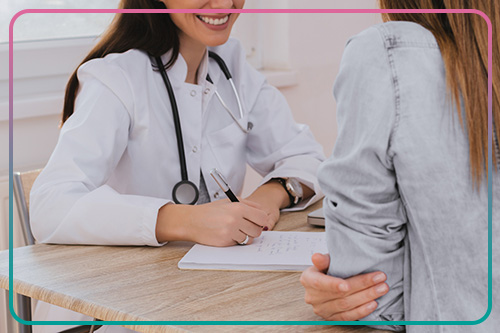Hayat MedTour is a medical tourism facilitator in Iran that has specialized in providing fertility assistance, infertility treatment and IVF in Iran at the best quality and affordable prices
Wednesday, April 27, 2022
HayatMedTour | Fertility Treatment in Iran | IVF in Iran
Sunday, February 6, 2022
Infertility Treatment Methods
Infertility Treatment Methods (IVF | ICSI | EGG
Donation)
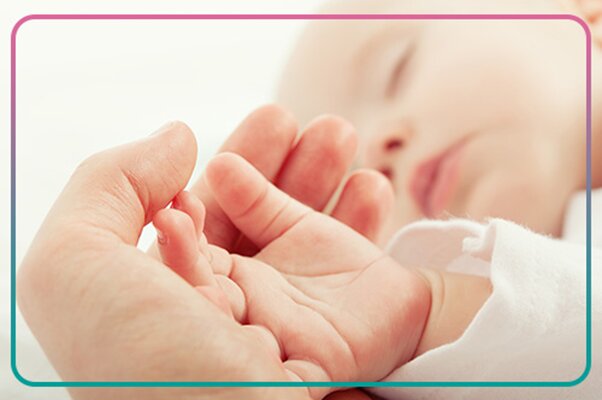
Tehran (ISNA) - Normal pregnancy depends on various factors and conditions, in case of any disorder in any of them, the chance of fertility is decreased or even may go to zero. Infertility is one of the unwanted life phenomena that have been recently increased. A couple who couldn’t have a baby after a year of having sex without contraception, they are considered as infertile. All things needed couples know about fertility treatment is described in this post.
Infertility and its affecting factors
A couple is considered infertile if they cannot become pregnant after 12 months of unprotected intercourse. For women over the age of 35, infertility means not having fertility after 6 months of unprotected sex. Various causes can lead to infertility in couples. In general, these factors can be summarized in female and male factors.
Female-infertility factors include abnormalities in the female reproductive system or poor egg quality that impairs fertility.
Male-Infertility Cause is one-third of couples’ infertility causes. These types of infertility indicate the presence of dysfunction in sperm production or ejaculation in the male.
Research shows that in a third of cases, a combination of female and male factors causes infertility in couples. About 10% of couples also suffer from unknown causes of infertility.
Different methods of fertility treatment
There are different methods of infertility treatment like IVF, ICSI, IUI, and Egg Donation which can help infertile couples and give them a chance to have a baby. Iran is one of the leading countries in the region and in the world in the field of infertility treatment, therefore many couples choose fertility treatment in Iran for infertility treatment.
Several advanced research institutes and hospitals, provide infertility treatment services like IVF in Iran to both local and international patients. Moreover, other fertility services such as Gender Selection are offered in these centers as well for people who choose fertility treatment in Iran.
In the following, some of the most important methods of infertility treatment are introduced.
What is IVF?
In Vitro Fertilization (IVF) is one of the assisted reproductive techniques (ART) in which a man’s sperm and the woman’s egg are combined in a laboratory dish, where fertilization occurs. When the egg is fertilized, the primary cell begins to divide and form the embryo. The resulting embryo or embryos is/are then transferred to the woman’s uterus to implant and develop naturally.
How is IVF done?
IVF is a common procedure, used to overcome a range of fertility issues. It is a multi-step process involving ovulation induction, egg retrieval, Collection and preparation of sperm, fertilization, culture, and embryo transfer. The IVF process can be explained in these five steps:
• Ovulation induction
The greater the number of oocytes prepared during a treatment cycle, the greater the chance of a healthy fetus forming and subsequently the chance of pregnancy. A doctor prescribes ovulation induction drugs to stimulate the growth of several oocytes in a woman’s cycle.

• Ovum Pick up:
During a minor surgery, the infertile doctor picks up the mature oocytes using a special needle. This is done under conditions of local or general anesthesia. The procedure usually takes less than 30 minutes.
• Collection and preparation of sperm
In vitro fertilization of the oocyte with sperm requires the collection of semen. If the male is unable to produce semen, TESE or PESA methods are used to collect sperm.
The collected sperms are washed by a specific method and examined for motility and shape. Finally, high-quality sperms are selected to fertilize the oocytes.
• Fertilization and embryo culture:
After the ovum picks up, the embryologist examines the obtained egg to select mature eggs that are suitable for fertilization.
The mature eggs are placed in a culture medium and the sperm is transferred to an incubator for fertilization. In IVF, high-motility sperms move to the eggs and fertilize them. Once this occurs, the fertilized eggs are considered embryos.
In conditions with a low number and low quality of sperm, the specialist uses intracytoplasmic sperm injection (ICSI). It is an additional part of an IVF treatment cycle in which a single sperm is injected into each egg to assist fertilization.
• Embryo Transfer
Finally, the selected embryos are prepared for transfer to the uterus. A specialist physician inserts the embryo into the mother’s uterus during a minor surgery without the need for anesthesia.
What is the difference between ICSI and IVF?
The difference between IVF and ICSI is in how the oocyte is fertilized. In IVF, the oocyte is exposed to sperm in an in -vitro container until the highly motile sperm enters the oocyte and fertilizes it. But in the ICSI technique, a selected sperm is injected directly into the oocyte through a special needle. In this method, high-quality and motile sperm are separated and ready for injection in a laboratory using a special method. The ICSI method is mostly used in cases where the quality of male sperm is low.
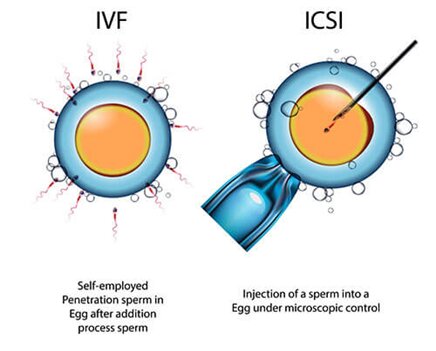
Egg donation
Infertility is not always cured by prescribing medication or using advanced methods of infertility treatment. In cases where a woman’s ovarian reserves are low or the quality of eggs is low, but the uterus and other reproductive organs are healthy, the only fertility way is to receive an egg donated by a volunteer. For a consult of our doctors and specialists and to use the service of Egg Donation in Iran, you can contact us through the HayatMedTour website.
Fertility treatment in Iran
With over 30 years of experience in infertility research and treatment, Iran is one of the world’s pioneers in effective infertility treatment. There are more than 80 specialized fertility treatment centers in Tehran, Urmia, Yazd, Isfahan, and other cities of Iran. These clinics with the up-date of knowledge and equipment in the world; offer various methods for infertility treatments with the best quality and reasonable prices.
The high quality and affordable cost of fertility treatments in Iran have led many medical tourists to choose this destination for the treatment of their infertility problems.
End Item
Monday, October 25, 2021
Fertility Treatment
There are 3 main types of fertility treatment:
- medicines
- surgical procedures
- assisted conception – including intrauterine insemination (IUI) and in vitro fertilizations (IVF)
Medicines
Common fertility medicines include:
- clomiphene – encourages the monthly release of an egg (ovulation) in women who do not ovulate regularly or cannot ovulate at all
- tamoxifen – an alternative to clomiphene that may be offered if you have ovulation problems
- metformin – is particularly beneficial for women who have polycystic ovary syndrome (PCOS)
- gonadotrophins – can help stimulate ovulation in women, and may also improve fertility in men
- gonadotrophin-releasing hormone and dopamine agonists – other types of medicine prescribed to encourage ovulation in women
Some of these medicines may cause side effects, such as nausea, vomiting, headaches and hot flushes.
Speak to your doctor for more information about the possible side effects of specific medicines.
Medicine that stimulates the ovaries is not recommended for women with unexplained infertility because it has not been found to increase their chances of getting pregnant.
Surgical procedures
There are several types of surgical procedures that may be used to investigate fertility problems and help with fertility.
Fallopian tube surgery
If your fallopian tubes have become blocked or scarred, you may need surgery to repair them.
Surgery can be used to break up the scar tissue in your fallopian tubes, making it easier for eggs to pass through them.
The success of surgery will depend on the extent of the damage to your fallopian tubes.
Possible complications from tubal surgery include an ectopic pregnancy, which is when the fertilised egg implants outside the womb.
Endometriosis, fibroids and PCOS
Endometriosis is when parts of the womb lining start growing outside the womb.
Laparoscopic surgery is often used to treat endometriosis by destroying or removing fluid-filled sacs called cysts.
It may also be used to remove submucosal fibroids, which are small growths in the womb.
If you have polycystic ovary syndrome (PCOS), a minor surgical procedure called laparoscopic ovarian drilling can be used if ovulation medicine has not worked.
This involves using either heat or a laser to destroy part of the ovary.
Read more about laparoscopy.
Correcting an epidydimal blockage and surgery to retrieve sperm
The epididymis is a coil-like structure in the testicles that helps store and transport sperm.
Sometimes the epididymis becomes blocked, preventing sperm from being ejaculated normally. If this is causing infertility, surgery can be used to correct the blockage.
Surgical extraction of sperm may be an option if you:
- have an obstruction that prevents the release of sperm
- were born without the tube that drains the sperm from the testicle (vas deferens)
- have had a vasectomy or a failed vasectomy reversal
Both operations take a few hours and are done under local anesthetic as outpatient procedures.
You'll be advised on the same day about the quality of the tissue or sperm collected.
Any sperm will be frozen and placed in storage for use at a later stage.
Assisted conception
Intrauterine insemination (IUI)
Intrauterine insemination (IUI), also known as artificial insemination, involves inserting sperm into the womb via a thin plastic tube passed through the cervix.
Sperm is first collected and washed in a fluid. The best quality specimens (the fastest moving) are selected.
Read more about IUI.
In vitro fertilizations (IVF)
In vitro fertilizations (IVF), is when an egg is fertilized outside the body. Fertility medicine is taken to encourage the ovaries to produce more eggs than usual.
Eggs are removed from the ovaries and fertilized with sperm in a laboratory. A fertilized egg (embryo) is then returned to the womb to grow and develop.
Egg and sperm donation
If you or your partner has an infertility problem, you may be able to receive eggs or sperm from a donor to help you conceive. Treatment with donor eggs is usually done using IVF.
Sunday, September 26, 2021
Tips to Prepare for Fertility Treatment
Most Important Tips to Prepare for Fertility Treatment
Over 80% of the time, fertility drugs can stimulate ovulation—fertility treatments are being done now more than ever. Current technology offers fertility treatments to make pregnancy a reality for many couples who would otherwise struggle. Fertility treatments are a highly involved process and can be both emotionally and physically taxing. However, certain things can help you prepare for fertility treatments to alleviate stress and increase the likelihood of a healthy pregnancy.
7 Tips to prepare for fertility treatments
- Quit unhealthy habits - When starting fertility treatments, quit smoking, drinking, and staying up late to help prepare your body for pregnancy while increasing the chances of getting pregnant.
- Maintain a healthy weight - Being overweight can affect pregnancy. Excess weight increases the risk of a miscarriage and can affect outcomes with in vitro fertilization procedures (IVF). A high BMI also affects the safety of undergoing anesthesia or sedation, which is necessary with IVF.
- Eat a balanced diet - Eating a wide variety of fruits, vegetables, lean proteins, and healthy fats can help you maintain a good weight while building up nutrition for better overall health.
- Get quality sleep - Sleep is crucial for cellular repair, maintaining stress levels, and essential for fertility. Set a goal of getting between 7/ 9 hours of quality sleep each night.
- Maintain stress levels- Stress can hurt the chances of successful fertility. Seek ways to maintain stress during this process. Try things like acupuncture, walking, journaling, and meditating to decrease anxiety.
- Change workout routines - Exercise is great for increasing fertility. Replacing running and extreme exercising like bodybuilding to a gentler routine. Yoga, walking, swimming, hiking, and biking are wonderful ways to get gentle exercise during fertility treatments and pregnancy.
- Begin taking a prenatal vitamin - It is recommended to increase nutrients during fertility treatments. Prenatal vitamins are an excellent choice to ensure the body has enough folic acid, which aids in developing the brain and spinal cord during pregnancy. Please discuss with your doctor what prenatal vitamins they recommend.
Sunday, August 29, 2021
things to do to make ivf successful
How to Increase Your Chances of IVF Success
If you are looking to increase your chances of conceiving during IVF, here are 8 tips from 5 different fertility doctors.

1. Maintain a healthy weight.
"Maintaining a healthy weight is extremely important infertility and IVF," says Linnea Goodman, MD, Assistant Professor of Obstetrics and Gynecology at the UNC School of Medicine. "We know that being obese (BMI >35) and underweight (BMI <19) increases the time of conception by 2 and 4 times respectively, and negatively affects IVF success rates. Being overweight also makes monitoring the ovaries during IVF more difficult and increases the chance of complications during egg retrievals."
This is best implemented with changes in diet and activity with professional help.
"Working with a dietitian, and in some programs enrolling in a cardiometabolic weight loss program can help achieve these goals," says Zaraq Khan, MD, a reproductive endocrinologist at Mayo Clinic in Rochester, MN.
2. Optimize sperm health.
"Use of multivitamins and maintaining optimal body weight, as well using boxers over briefs, could improve sperm quality," says Dr. Khan. "Under appropriate care, men can also be started on medications that can help boost sperm numbers and quality that can have a beneficial impact on IVF outcome. In certain cases, sperm aspirated directly from the testicle over ejaculate could also be beneficial. Involving a male infertility specialist for any form of abnormalities in semen analyses is key."
3. Partner with an excellent doctor and embryology laboratory.
"Choosing an excellent reproductive endocrinologist is twofold: in addition to experience and commitment to evidence-based medicine, look for someone with whom you feel comfortable and connected. Your doctor will accompany you on this very emotional journey and it is important for you to feel supported and heard," says Elizabeth Fino, MD, fertility specialist at NYU Langone Fertility Center. "Asking for recommendations from friends and family who know you best can help guide you to a knowledgeable physician with whom you feel comfortable, but also be sure to do your research."
In a world of online reviews, it can be difficult to determine credibility.
"Be careful of online reviews—they are often completed by select patients who had an extreme experience for one reason or another and may not be universally applicable. FertilityIQ offers a unique model which hones in on specific aspects of the experience after vetting patient reviews.
To find an excellent embryology laboratory, look for a long history of exceptional outcomes. One source is the Society for Assisted Reproductive Technology which details the clinic's volume and live birth rate."
4. Reduce your stress.
"Basal stress levels can influence natural and assisted conception rates," says Dr. Khan. "Reducing stress troubles during an IVF stimulation cycle can be one of the hardest things to achieve for couples. Several reports suggest improvement of pregnancy outcomes with the use of acupuncture and other stress-relieving techniques, like enrolling in mind-body programs, stress reduction, and resilience training workshops."
5. Quit smoking
"Smoking can drastically decrease the chance of success while doing IVF because it affects egg and sperm quality," says Dr. Khan.
But you don't have to do it on your own.
"Quitting smoking is not an easy task and often requires a great deal of personal as well as professional support. Try to involve your friends and family to help encourage you in the process. For smoking cessation, structured programs and/or pharmacological assistance have proven to be most successful," says Dr. Fino.
6. Look into taking supplements
"DHEA and CoQ10 are supplements that have shown some promise in association with an increase in egg quantity and quality," says Dr. Fino. "Talk to your doctor to see if he or she recommends them for you."
Multivitamins may also be helpful, adds Dr. Khan.
7. Ensure you have adequate levels of vitamin D
"Over 40% of individuals are deficient in Vitamin D, and there is emerging data on its association with infertility and worse IVF outcomes," says Tarun Jain, MD, medical director of Northwestern Medicine Fertility and Reproductive Medicine Oakbrook Terrace. "Ask your doctor to check your vitamin D level, and consider taking a vitamin D supplement."
8. Focus on persistence and patience.
"Many patients require more than one cycle of IVF to achieve an embryo for transfer and outcomes may vary significantly from cycle to cycle," says Shannon DeVore, MD, at NYU Langone Fertility Center. "If your first cycle wasn't successful, your doctor may be able to adjust the medications to optimize a subsequent one. Other times, it just means keeping at it. Try not to be discouraged by sub-optimal outcomes and setbacks—you are doing everything right. The single biggest thing to remember is that most (or all) of this is out of your control. Nobody likes a lack of control, but sometimes letting go can help you endure the journey. Take care of yourself and don't blame yourself when things don't go well. You are not alone, it often takes a village to build a family."
Monday, July 19, 2021
Improve Egg Quality and Boost Fertility
7 Tips to Improve Egg Quality and Boost Fertility
Women often ask if there is a natural or 'at home remedy' for boosting egg quality and improving fertility and the chances of pregnancy. Dr. Hirshfeld-Cytron explains what you can do to ensure that your eggs can be the best when preparing for conception.
1. Stay Away from Cigarettes.
Smoking permanently speeds up egg loss in the ovaries. The chemicals in cigarettes mutate the DNA in a woman's egg cells, making some of the eggs unsuitable for conception. Women are born with all the eggs they will ever have, and the number of eggs reduces with age, so it is best to keep eggs healthy and free of unnecessary chemicals.
2. Manage Stress.
Stress can produce hormones such as cortisol and prolactin that can interfere with or halt ovulation, which also hinders egg production. Stress-reducing activities such as yoga, meditation, exercise, or a warm bath can help keep stress and frustration at bay.
3. Eat Healthily.
Healthy foods improve overall health, this includes helping your eggs stay healthy and high quality, as well as improve overall fertility. Eat plenty of leafy greens, whole grains, lean meats, nuts, fresh vegetables, and fruits. Stay away from trans fats, refined carbs, processed foods or meats, and excessive salt and sugar.
4. Achieve a Normal BMI (body mass index).
Obesity has been linked to reduced fertility and decreased egg quality due to alterations of mitochondrial function and increased oxidative stress. Being overweight can also alter the hormonal balance, disrupting ovulation. A body mass index (BMI) between 18.5-24.9 is recommended to achieve pregnancy. To give you an idea of what that looks like, a woman that is 5’6” falls within a normal BMI with a weight range of 115-154 lbs.
5. Boost Blood Flow.
Good egg health is aided by oxygen-rich blood flow to the ovaries. Blood flow in the body can quickly decrease from dehydration, so aim to drink 64 oz. of water each day. Yoga is a healthy and relaxing way to improve blood flow, with poses such as the lotus pose, child’s pose, reclining hero, and seated forward bend offering a specific fertility benefit.
6. Invest in Supplements.
There is no need to break the bank on vitamins, but three low-cost options can help with egg health: Coenzyme Q10, melatonin, and fish oil. CoQ10 can boost mitochondrial function as well as antioxidants, improving the quality of eggs (200 mg, 3x daily); melatonin can boost antioxidants, encourage ovarian function, and aid in sleep (3mg each evening); and fish oil (EPA/DHA) can help produce higher quality eggs and help reproductive function in advanced maternal age (1200-1500mg EPA + DHA daily, do not exceed 3000 mg/day).
7. Freeze Your Eggs.
If you are planning on delaying motherhood, the best way to protect your fertility future is to stop your biological clock and freeze your eggs. With time, a woman’s natural fertility declines, but frozen eggs remain the same biological age as when they are cryopreserved, boosting your chances of future success.
Saturday, July 3, 2021
Egg donation
Egg donation is a process in which a fertile woman donates an egg, or oocyte, to another woman to help her conceive. It is a part of assisted reproductive technology, or ART.
The procedure typically involves a doctor removing an egg or eggs from the donor, fertilizing them in a laboratory, and then transferring the resulting embryos into the recipient’s uterus. Doctors do this using an implantation procedure, such as in vitro fertilization (IVF).
Sometimes, specialists at the facility may freeze some or all of the embryos for later use or implantation in different women.
Egg donation frequently benefits women who cannot use their own eggs for various reasons, including ovarian failure, avoiding congenital anomalies in the fetus, or advanced age.
One 2014 entry in the journal Fertility and Sterility suggested that 93 percentTrusted Source of all fertility centers in the United States offer egg donation. The same study indicates that the procedure results in a successful birth 49.4–50 percent of the time.
In this article, we look at the criteria for selecting donors, the procedure itself, and legal ramifications following an egg donation.
The clinic will conduct a thorough selection process for potential donors.
Specialists at the fertility facility will conduct an intensive selection process to find a suitable donor and will carefully run through the legal procedures.
Before starting the procedure, most donors will need to take medication that stops their normal menstrual cycle.
Side effects of this medication might include:
- hot flashes
- headache
- fatigue
- body aches
The donor will then take a series of fertility drugs that stimulate the ovaries to produce several eggs at once. This is known as hyperstimulation. Donors will need to self-administer this medication by injecting it under their skin or into a muscle.
Some women may experience mild side effects, such as bruising at the injection site, mood swings, and tender breasts. In rare cases, a woman may develop severe ovarian hyperstimulation syndrome (OHSS). This occurs when too many eggs develop in the ovaries. Women who develop OHSS may require hospitalization.
Donors do have a risk of pregnancy before the eggs are retrieved, so it is a good idea to avoid intercourse or use a barrier contraceptive, such as a condom.
Throughout the donation cycle, a donor will undergo frequent blood tests and ultrasound examinations to monitor their reactions to the medications.
During extraction the eggs
Shortly before the retrieval of the eggs, the donor will receive a final injection in preparation for the procedure.
The doctor will perform a transvaginal ovarian aspiration to remove the eggs from the donor’s ovaries. They will insert an ultrasound probe into the vagina and use a needle to remove the egg from each follicle.
During the procedure, which lasts around 30 minutes, the doctor might give the donor painkillers, sedatives, or an anesthetic.
As this is a minor procedure, a donor will not need to stay at the clinic or hospital overnight.
After Egg Donation
Some women find they need several days of rest to recover from the transvaginal ovarian aspiration. Others return to normal activities the next day.
Some programs provide aftercare to donors, but others do not. As the egg donation process can have a psychological impact, some women may find it useful to work with a counselor or psychotherapist after the procedure.
Saturday, June 26, 2021
Egg donation cost in Iran
Egg donation in Iran
Infertility treatment centers in Iran since the late 1990s, along with the world’s advanced centers, have used egg donation to treat infertile couples who suffer from the low ovarian reserve or poor quality eggs. In addition to Iranian infertility couples, foreign couples can also use the egg donation services of infertility treatment centers in Iran to solve the problem of infertility. Every year, infertile couples from different countries such as Iraq, Oman, Turkey, Kuwait, Afghanistan, Australia, Azerbaijan, Armenia, UAE, etc. go to Iranian fertility treatment centers to solve their infertility problem and use egg donation in Iran.
Egg donors are selected following certain principles and standards in Iran. Egg donation volunteers are consulted after various tests and physical health assurance; to ensure their mental health and readiness to donate. Donated eggs are examined in well-equipped Iranian laboratories, and quality eggs are selected for the next steps.
Egg donation cost in Iran
The cost of infertility treatment using donated eggs in Iran includes the cost of eggs and the cost of medicine, conventional tests, and the transfer of the fetus to the mother’s uterus. The cost of a donated egg service in Iran (IVF with donor eggs in Iran) is about 4,000 $. Egg donation service in reputable infertility treatment centers in Iran and high quality and world-class has an affordable price.
couples who want to select their baby sex can use PGD service for determining embryo gender. One of the PGD techniques uses is to determine the sex of the embryos before transferring to the uterus and pregnancy.
You can contact us to benefit from infertility treatment services using donated eggs in Iran & IVF with donor eggs in Iran.
We are with you to hug your beloved child.
Thursday, May 27, 2021
Everything about Egg Donation
Why Use an Egg Donor?
The most common reason why single women and couples turn to egg donation is poor egg quality due to advanced maternal age. A woman’s egg quality lessens as she ages and significantly declines after age 37.
Who Uses Egg Donation?
- Couples in which the woman has poor-quality or no eggs, but who want a biological child using the male’s sperm
- Women with no ovaries but an intact uterus
- Women with genetic factors that they do not want to pass on to their children
- Women over the age of 42
There are many things to consider when thinking about using an egg donor. If you have a partner, start by exploring these questions.
Fact: The first known pregnancy achieved with a donated egg occurred in 1984. In 2016, the CDC reported approximately 9,000 births resulting from donor eggs.
Egg Donation Requirements
Egg donors undergo psychological and medical screening, which includes a thorough medical history, physical exam, and ovarian reserve assessment to determine if she is likely to be a good donor candidate. Egg donors are healthy young women, usually between ages 21 and 30.
Egg Donation Process
- The egg donor gets hormone injections to induce ovulation of multiple eggs. Women naturally release one egg a month and the injections allow a large number of eggs to mature at the same time. Once her eggs are mature and ready for retrieval, her fertility doctor schedules the procedure.
- The egg donor is put under sedation and her doctor uses an ultrasound-guided needle inserted into each mature follicle to retrieve each egg. The lab will attempt to fertilize several eggs in a laboratory using the recipient’s partner’s sperm or selected donor sperm. This process is in vitro fertilization (IVF).
- An embryo (fertilized egg) is then transferred into the recipient’s uterus.
In a fresh transfer cycle, the donor and the recipient’s cycles are synchronized using medication.
In a frozen transfer, the embryos are frozen and typically transferred at a later time. Frozen transfers are sometimes utilized to perform preimplantation genetic screening for aneuploidy (an abnormal number of chromosomes).
If successful, the embryo will implant into the uterine lining and develop into a healthy baby.
Egg Donor Cost and Sources
Commercial egg donor agencies recruit, screen, and match healthy donors with couples and individuals. Many infertility clinics also offer donated eggs from couples who have produced excess eggs.
In some cases, the recipient may ask a close friend or relative to donate her eggs. Recipients may choose a fresh egg donation cycle or a frozen egg donation cycle (from a frozen egg bank).
Egg Donation Success Factors
Success depends on many factors, including the egg donor's age, retrieval process, quality of sperm, and the recipient’s overall health.
As with all third-party reproduction processes, recipients should seek counseling to explore emotional concerns and an experienced attorney to protect their, and their potential children’s, rights
Thursday, April 15, 2021
Lifestyle tips for IVF
lifestyle and diet go hand-in-hand, for the success of your IVF outcome. Obviously, alcohol and smoking are counterproductive to your health, and the health of your baby, as are any other recreational drugs. If you’re feeling stressed try some of these healthy ways to cope, today and going forward.
Talk with a friend, or seek out a therapist who specializes in helping those undergoing fertility treatment. Ask your fertility team for a referral.
- Exercise, especially if you’ve maintained a fitness program for a while. But, as always, check with your physician first.
- Practice yoga and meditation. These ancient arts have calmed and centered people for centuries.
- Treat yourself! Schedule a day at a spa. A little pampering and self-care do wonder for the soul. And don’t leave it at the spa. Extend your feel-good self-care by taking regular bubble baths, scheduled therapeutic massages, and learn to listen to your body.
- Say no to outside stresses right now, including family gatherings and other social obligations, volunteering, extra work commitments, and even something as simple as doing the grocery shopping. Learning to say “not right now” is one of the healthiest things you can do for yourself and your future family.
Wednesday, October 14, 2020
male infertility treatment by IVF
Sometimes, for male infertility treatment, IVF is the best treatment option. When the semen analysis is abnormal and identifies a malefactor, it’s important to look for the cause. If the low sperm count appears to hormone-related, caused by an infection, or related to a male anatomic abnormality, basic treatments may be used. If these do not work, or if it is a more severe case of male infertility, IVF is usually the treatment of choice.
Options other than IVF for male infertility
For hormonal imbalances like a low testosterone level, Doctors may choose medications like Clomid or fertility shots. The partners of men with decreased sperm counts and normal hormone levels will often undergo IUI. This is a simple and relatively inexpensive treatment for mild cases of male infertility.
Anatomical abnormalities that contribute to male infertility often require further evaluation by a urologist. Urologists are specialists regarding the male reproductive system. They will work with the Doctor to determine what treatment is necessary.
If the sperm count is too low for IUI, IVF for male infertility may be the best treatment option. This treatment is a very successful option for couples with male factor infertility.
When do we recommend IVF for male infertility?
If a semen analysis reveals a very low concentration of normal sperm, the Doctor often will recommend IVF for male infertility. This is because the chances of success are much better than timed intercourse or IUI.
IVF is also a good option when there are multiple fertility factors, such as a low sperm count in combination with a blocked tube, difficulty in ovulation, or advanced age of the woman. IVF can be the most effective treatment for couples in these situations by increasing the chance of fertilization of the egg.
The reason why is as follows:
- Sperm with poor motility can still be used to fertilize eggs through IVF. By placing sperm and egg in close proximity in a petri dish, the poorly motile sperm do not have to travel far to reach the egg, and fertilization is controlled in the lab.
- Low sperm counts can still achieve fertilization through IVF
Because the egg and sperm meet in the lab, the sperm have no chance of “getting lost” in the female reproductive tract. Normally, sperm travel along the specific path to reach the egg, but many fall off during the trip. If there isn’t enough sperm that can make the trek to the egg, fertilization never happens.
- For the severe male factor, IVF with intracytoplasmic sperm injection (ICSI) will be performed.
- ICSI involves carefully choosing a single sperm and injecting this sperm directly into the egg, which improves the chance for fertilization. ICSI is also performed when sperm is retrieved by performing a biopsy of the testicle, also known as TESE (testicular sperm extraction), or when a frozen sperm specimen is used.
Tuesday, September 22, 2020
risks of IVF
IVF treatment doesn't always result in pregnancy, and it can be both physically and emotionally demanding. You should be offered counseling to help you through the process.
There are also a number of health risks involved, including:
- side effects from the medications used during treatment, such as hot flushes and headaches
- multiple births (such as twins or triplets) – this can be dangerous for both the mother and the children
- an ectopic pregnancy – where the embryo implants in the fallopian tubes, rather than in the womb
- ovarian hyperstimulation syndrome (OHSS) – where too many eggs develop in the ovaries
Read more about risks of IVF.
Sunday, September 13, 2020
IVF step by step
IVF treatment involves 6 main stages:
- suppressing your natural cycle – the menstrual cycle is suppressed with medication
- boosting your egg supply – medication is used to encourage the ovaries to produce more eggs than usual
- monitoring your progress and maturing your eggs – an ultrasound scan is carried out to check the development of the eggs, and medication is used to help them mature
- collecting the eggs – a needle is inserted into the ovaries, via the vagina, to remove the eggs
- fertilizing the eggs – the eggs are mixed with the sperm for a few days to allow them to be fertilized
- transferring the embryo(s) – 1 or 2 fertilized eggs (embryos) are placed into the womb
Once the embryo(s) has been transferred into your womb, you'll need to wait 2 weeks before taking a pregnancy test to see if the treatment has worked.
Saturday, September 5, 2020
IVF Costs in Iran
The average cost of an IVF cycle in the U.S. is $12,400, according to the American Society of Reproductive Medicine. This price will vary depending on where you live, the number of medications you're required to take, the number of IVF cycles you undergo, and the amount your insurance company will pay toward the procedure. You should thoroughly investigate your insurance company's coverage of IVF and ask for a written statement of your benefits. Although some states have enacted laws requiring insurance companies to cover at least some of the costs of infertility treatment, many states haven't.Costs-of-IVF

The cost of IVF in Iran is more affordable than in other countries. Also, in Iran, the infertility treatment services such as IVF have a high quality in the region and in the world. The low-cost of IVF in Iran is due to the low doctors’ wages and inexpensive services in the clinic. The medications cost are the same all over the world. Learn more about IVF cost in Iran: The cost of IVF in Iran
Tuesday, September 1, 2020
Issues With IVF
Any embryos that you do not use in your first IVF attempt can be frozen for later use. This will save you money if you undergo IVF a second or third time. If you do not want your leftover embryos, you may donate them to another infertile couple, or you and your partner can ask the clinic to destroy the embryos. Both you and your partner must agree before the clinic will destroy or donate your embryos.

A woman's age is a major factor in the success of IVF for any couple. For instance, a woman who is under age 35 and undergoes IVF has a 39.6% chance of having a baby, while a woman over age 40 has an 11.5% chance. However, the CDC recently found that the success rate is increasing in every age group as the techniques are refined and doctors become more experienced.
Tuesday, August 25, 2020
IVF success rate
IVF success rate depends on a number of factors, including the reason for infertility, where you're having the procedure done, and your age.
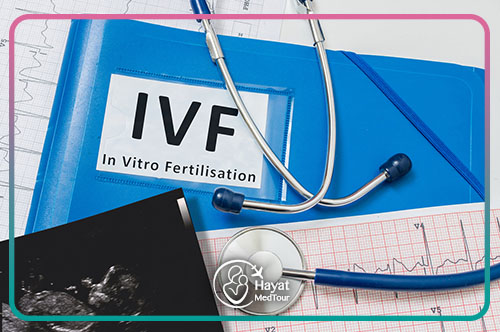
The CDC compiles national statistics for all assisted reproductive technology (ART) procedures performed in the U.S., including IVF, GIFT, and ZIFT, although IVF is by far the most common; it accounts for 99% of the procedures. The most recent report from 2016 found:
- Pregnancy was achieved in an average of 27.3% of all cycles (higher or lower depending on the age of the woman).
- The percentage of cycles that resulted in live births was 22.2% on average (higher or lower depending on the age of the woman).
Saturday, August 15, 2020
What Can I Expect From IVF?
The first step in IVF involves injecting hormones so you produce multiple eggs each month instead of only one. You will then be tested to determine whether you're ready for egg retrieval.
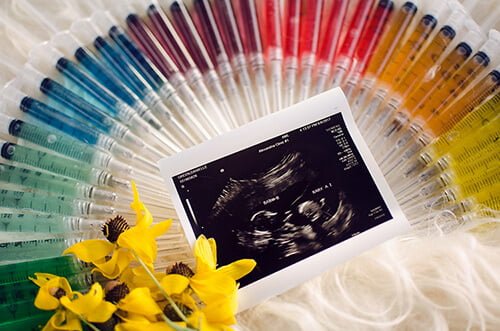
Prior to the retrieval procedure, you will be given injections of a medication that ripens the developing eggs and starts the process of ovulation. Timing is important; the eggs must be retrieved just before they emerge from the follicles in the ovaries. If the eggs are taken out too early or too late, they won't develop normally. Your doctor may do blood tests or an ultrasound to be sure the eggs are at the right stage of development before retrieving them. The IVF facility will provide you with special instructions to follow the night before and the day of the procedure. Most women are given pain medication and the choice of being mildly sedated or going under full anesthesia.
During the procedure, your doctor will locate follicles in the ovary with ultrasound and remove the eggs with a hollow needle. The procedure usually takes less than 30 minutes, but may take up to an hour.
Immediately following the retrieval, your eggs will be mixed in the laboratory with your partner's sperm, which he will have donated on the same day.
While you and your partner go home, the fertilized eggs are kept in the clinic under observation to ensure optimal growth. Depending on the clinic, you may even wait up to five days until the embryo reaches a more advanced blastocyst stage.
Once the embryos are ready, you will return to the IVF facility so doctors can transfer one or more into your uterus. This procedure is quicker and easier than the retrieval of the egg. The doctor will insert a flexible tube called a catheter through your vagina and cervix and into your uterus, where the embryos will be deposited. To increase the chances of pregnancy, most IVF experts recommend transferring up to three embryos at a time. However, this means you could have multiple pregnancies, which can increase health. risks for both you and the babies
Following the procedure, you would typically stay in bed for several hours and be discharged four to six hours later. Your doctor will probably perform a pregnancy test on you about two weeks after the embryo transfer.
In cases where the man's sperm count is extremely low or there is poor motility (movement of the sperm), doctors may combine IVF with a procedure called intracytoplasmic sperm injection. In this procedure, sperm is taken from semen -- or in some cases right from the testicles -- and inserted directly into the egg. Once a viable embryo is produced, it is transferred to the uterus using the usual IVF procedure.
Saturday, August 8, 2020
Causes of Infertility Can Treated by IVF
When it comes to infertility, IVF can be an option if you or your partner have been diagnosed with:
- Endometriosis
- Low sperm counts
- Problems with the uterus or fallopian tubes
- Problems with ovulation
- Antibody problems that harm sperm or eggs
- The inability of sperm to penetrate or survive in the cervical mucus
- Poor egg quality
- The genetic disease of mother or father
- An unexplained fertility problem
IVF method is never the first step in the treatment of infertility except in cases of complete tubal blockage. Instead, it's reserved for cases in which other methods such as fertility drugs, surgery, and artificial insemination haven't worked.




